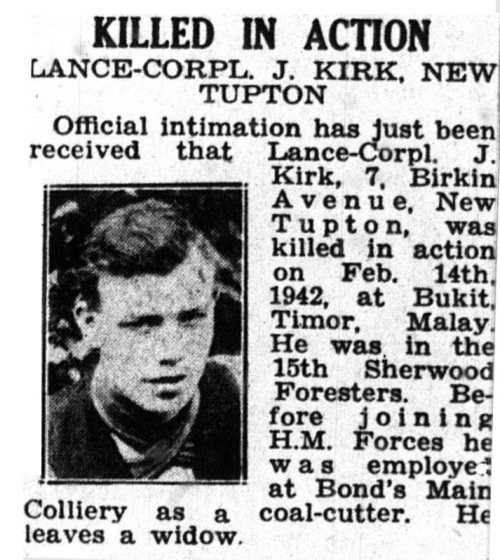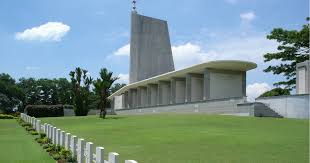Joseph Kirk

| Surname | Kirk | |
| Forename/s | Joseph | |
| Rank | Lance Corporal | |
| Service Number | 4977763 | |
| DOB | Circa 1903 | |
| Address | In 1911 the family lived at 1, Wrights Row, New Tupton and in the 1940’s his family home was 7, Birkin Avenue, New Tupton | |
| Date & place of death/details | 14/2/1942 age 36 | |
| Regiment & Unit | 1st/5th Battalion, Sherwood Foresters (Nottinghamshire & Derbyshire Regiment) | |
| Service details | ||
| Military Awards? | ||
| Married Children | Married to Ellen and had 3 children, Ellen, Veronica and John J. | |
| Any photographs? | ||
| Derbyshire Times Obituary |
 |
|
| Parents names | ||
| Parents address | ||
| Grave location or memoria location | No grave, Singapore Memorial, Column 70. | |
| Living relatives? | ||
| Any other information? |
Joseph is recorded as
working as a miner at Bonds Main colliery No details of when
Joseph joined the 1st/5th
Battalion the Sherwood Foresters, but it was
either in 1940 or 1941. It is possible that he
fought with the British Expeditionary Force in
France. Or he may have joined after Dunkirk when
the battalion was in the process of being
refitted and became part of the 18th
Infantry Division. Private Ralph Jones from
Tupton was also in the 1st/5th
Sherwood Foresters. In December 1941
Joseph and his battalion were on a convoy bound
for the Middle East, when news came that the
Japanese had entered the war attacking Malaya,
The Philippines and Pearl Harbour. The convoy
was diverted to reinforce the Singapore
Garrison. The 18th
Infantry Division arrived at Singapore in stages
from the 29th January to the 5th
February. By this time the Japanese Army had
advanced down the length of the Malayan
Peninsular and were about to attack Singapore
itself. The battle for
Singapore started on the 8th February
1942 and was to last for 7 days. The 1st/5th
Sherwood Foresters, despite having 2 months at
sea and being trained for open, not jungle
warfare, were thrown straight into the battle
and involved in the fierce fighting at Bukit
Timah. This was to no avail, as the Japanese had
overrun the food and fuel dumps for Singapore
and cut off the water supply to the city. Despite outnumbering
the Japanese 2:1, being low on ammunition and
supplies, on the 15th February 1942
General Percival surrendered the city placing
85,000 British and Australian troops into
captivity joining the 50,000 already captured in
the earlier part of the campaign. Churchill was
to comment, ‘’This was the worst disaster and
largest capitulation in British History’’ Joseph’s obituary
states that he died on the 14th
February 1942 at Bukit Timah. This was the last
day of the battle, when the fighting was at its
most desperate. His body was not recovered and
he is remembered on the Singapore Memorial,
Column 70.  |